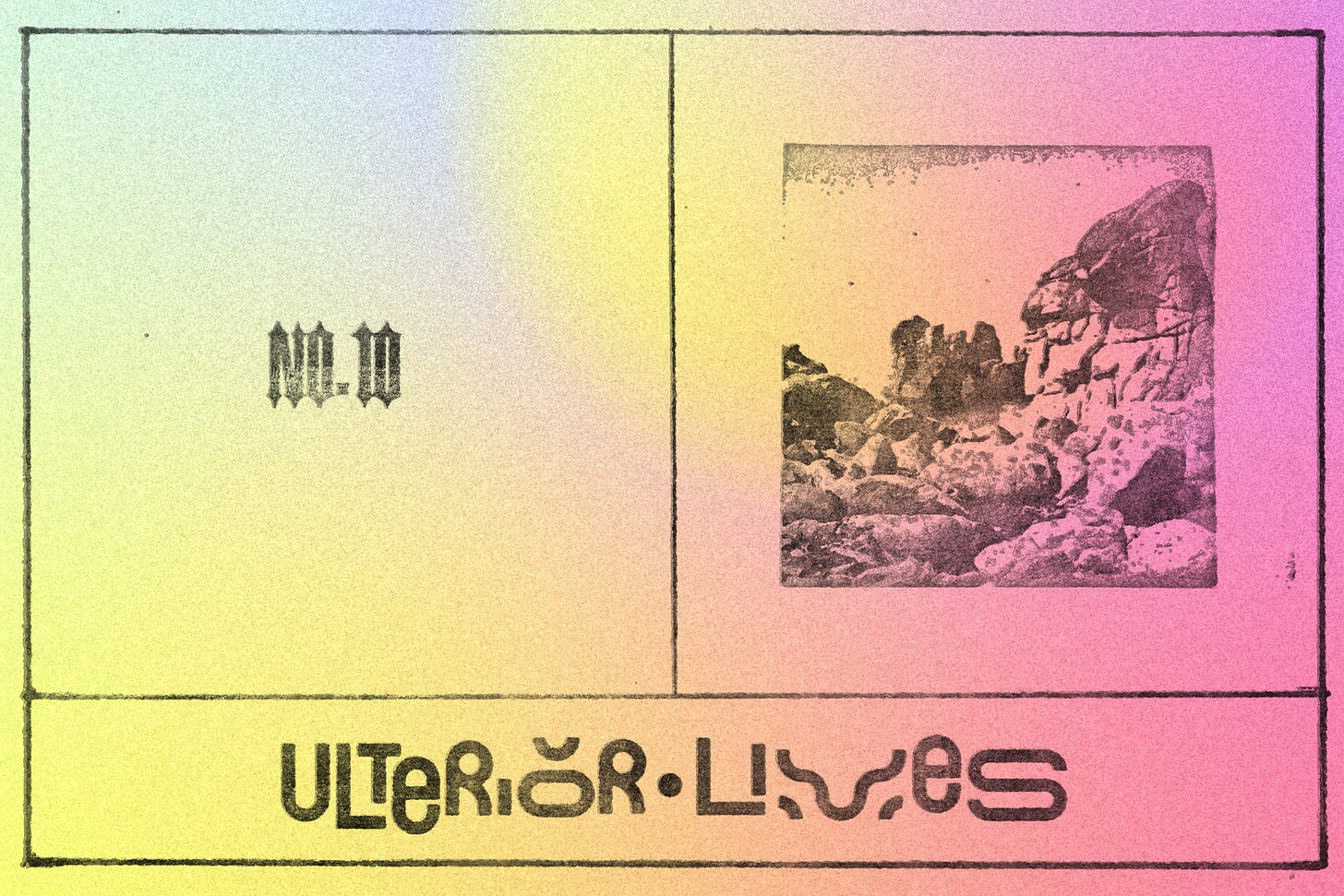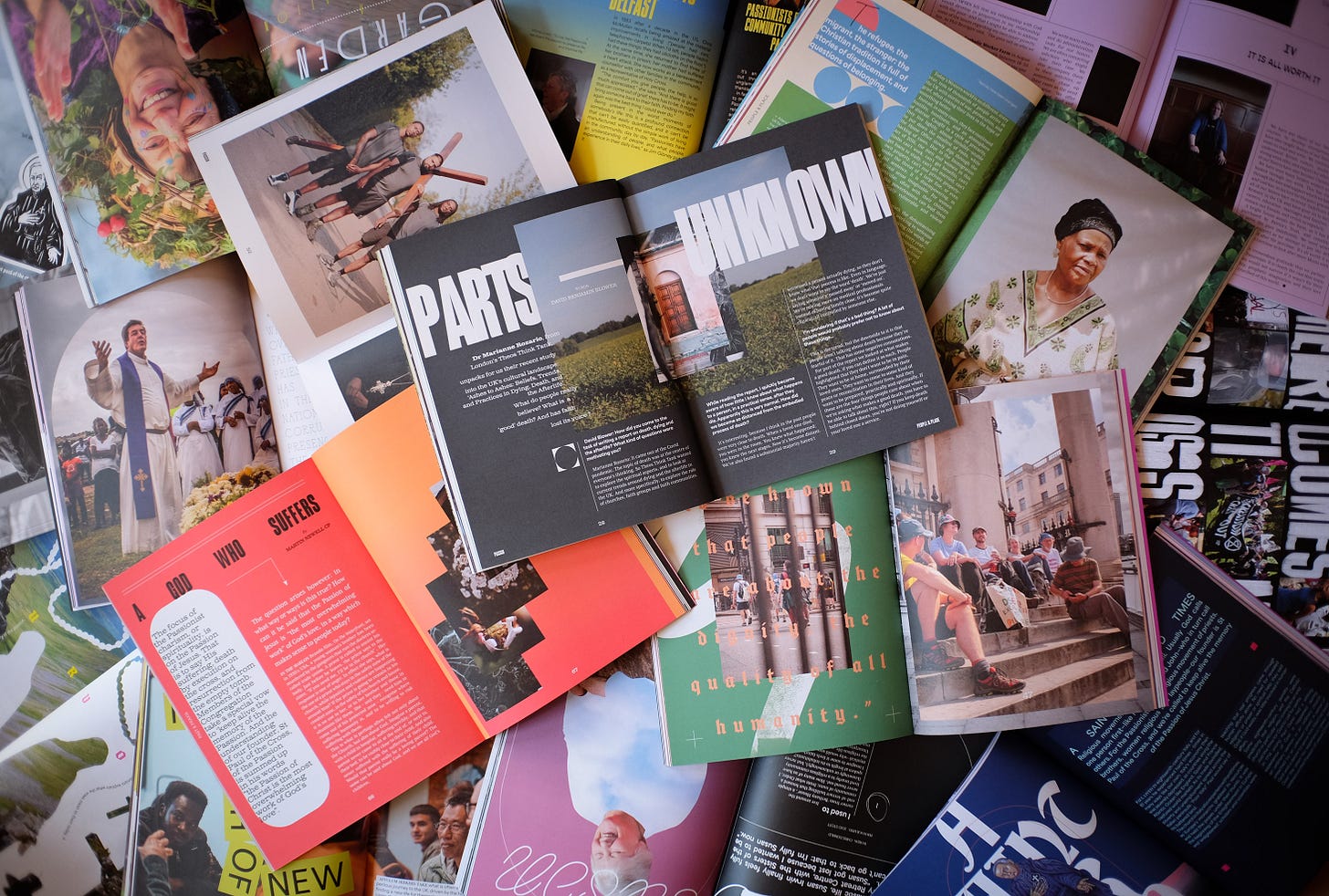Where and how did the Hermits live?
Unpicking the surprising, and moving, practicalities of early ascetic lives.
Part 10 of our Ulterior Lives series: A Slow Research Project into The Outsider Politics of Monasticism. Read the introduction here.
There are many tales of present-day hermits, living outside the prevailing systems: the man who lived a year without money; the woman who lives nomadically in the mountainous regions of wherever on her bike; the van life couples; the bush-crafters and off-grid home-builders. The question is always: how? How do you live? What do you eat? Where do you get the things you need? So many people dream of escaping a spiralling capitalist political economy; but even so, everything remains part of what Wendell Berry called The Great Economy. Everyone still lives in some pattern. What's the pattern that means this works?
I have all the same questions for the desert hermits. I want to know what their dwellings were like. What did they sleep on? Was the desert cold at night? What did they eat in a week? What did they drink? How did they cook? Did they use money? Did they work? Did they mostly die young? The Sayings occasionally give incidental windows into some of these matters, but rarely detailed descriptions. In my general ignorance on the subject, I would be glad to hear recommendations of historical books and studies that might help paint a picture.
Helen Waddel's book The Desert Fathers - a collection of translated historical texts - includes some passages from History of the Monks of Egypt by Rufinus of Aquileia. This is a rather romanticised travelogue through various desert communities, but it gives some helpful sketches of how their material life played out.
Here are four windows into the hermits’ material lives, from the account of Rufinus.
The first is found not so far from civilisation. Rufinus describes a settlement around the city of Arsinoe where a community of more than 10,000 hermits reside under the care of a certain Serapion.
All of them earned their bread by the work of their hands, and the great part of what they earned, especially at harvest time, they brought to the father, for the use of the poor. For it was the custom, not only among these but among most of the Egyptian monks, to hire themselves out at harvest time as harvesters, and each one among them would earn eighty measures of corn, more or less, and offer the greater part of it to the poor, so that not only were the hungry folk of the countryside fed, but ships were sent to Alexandria laden with corn, to be divided among such as were prisoners in gaols, or as were foreigners and in need. For there was not enough poverty in Egypt to consume the fruit of their compassion and their lavishness.
This is an eye-opening read. Among the many tales of solitude and silence here is a community of thousands gathered just outside the city limits in a self-organised structure. They were not at all cut off from existing economies but hired themselves out as labourers. From their voluntary poverty, they took upon themselves, ironically, a kind of ulterior super-tax, organising themselves such that they could give most of what they earned to the hungry, to the criminalised and to immigrants. The scale is surprising, and the ongoing connection to the cities is also surprising, especially since it is often said that the desert hermits did not generally devote themselves to organised compassionate action, but rather to prayer and devotion.
Here is the second window. As Rufinus continues the journey onward, the silence grows and the scale recedes. In the region of Nitria, he finds what he describes as a monastery. These were not the regimented cloisters that might spring to mind, but rather an improvised community of hermits who chose to build their cells in close proximity and to develop a shared pattern of prayerful life together.
Here is the scene as Rufinus approaches the fifty odd cells that made up that settlement:
Straight away they poured out like a swarm of bees, each from his cell, and ran out to meet us, joyous and eager, the most part carrying pitchers of water and loaves of bread […]. And after they had welcomed us they brought us first with psalms to the church and washed our feet, and one by one dried them with the linen that girded them, as if to disperse the weariness of the road, and in very act to purge the stains of mortal life in the traditional mystery.
A minor festival in some secret utopia. Rufinus continues, “Nowhere have I seen love so in flower, nowhere so quick compassion, or hospitality so eager.” What can we learn from this passing glimpse? I suppose that, amid the ascetic dearth, life might yet be beautiful and happy, perhaps all the more so.
Many of them chose to live in improvised communities of mutual aid and common devotion. They had returned to a model of village economics, where there is less wealth, less disparity and greater generosity, stability and reciprocity: the opposite of Caesar and State in all respects. Hospitality was central, perhaps even before they knew who the visitor was. This is not to be mistaken for mere religious virtue; it was an economic and political choice, a coherent approach to material life.
The third window is yet further outward. Rufinus goes on:
Beyond this there is another place in the inner desert, about nine miles distant: and this place, by reason of the multitude of cells dispersed through the desert, they call Cellia, The Cells. To this place those who have had their first initiation and who desire to live a remote life, stripped of all its trappings, withdraw themselves: for the desert is vast and the cells are saundered from one another by so wide a space, that none is in sight of his neighbour, nor can any voice be heard. One by one they abide in their cells, a mighty silence and a great quiet among them…
It is said that the cells were often miles apart. Here we can learn a little bit about their dwellings, as well as the politics of property, communality and mutuality, from what Rufinus says about a well loved hermit there named Ammon.
So then we saw this man of God in his cell with a wall about it: a cell is easily built in those parts, ample enough, with rough bricks: he had all that was necessary within, and had himself digged a well. But there came a certain brother, anxious to be near him for his soul's health, and he went to Ammon to ask if there were a small cell vacant anywhere, in which he might live. Then said he, ‘I shall make inquiry: but until I find one, do thou stay here in this hermitage: I go out even now to see to it.’ And leaving him with all he had, as well as the hermitage, he found himself a poor cell some distance away and settled himself in it, and gave up his entire hermitage and all that was in it to the unwitting brother.
But if it happened that there were many that came, anxious to be saved, the old man would bring the brethren together, all eager in helping, and would build a hermitage in one day. And when one by one the number of cells was complete, those who were to dwell in them were invited to the church under colour of making a feast, and when they were busied within, each of the brethren would bring from his cell such things as were necessary, and furnish the new cells one by one, so that by this community of charity, no utensil or aught that one needs for victuals was wanting, and yet no one knew whose might be the gift. And so on their return at evening, those for whom the cells were prepared found them furnished with all that was needful, and the habitation so provided that they could see no lack.
Notice the kindly deceits, one after another: that trickster-ish gratuitousness, so characteristic of the hermetic pattern of life.
This series of windows into the material realities of the hermits gives a helpfully complex picture. People made their own choices about the degree of solitude and simplicity they wished to live out. Roughly speaking, the more severe wandered further out. And yet those who dwelt en mass outside the cities were capable of things that were not practicable by those in deep and distant solitude. On the other hand, Rufinus claims that even those who dwelt in obscurity were somehow motivated by love of the other and by some mystery of common life.
Here is the fourth window: a portrait of the dwellings of Macarius of Alexandria:
They said that he was a lover beyond all other men of the desert, and had explored its ultimate and inaccessible wastes… The place in which Macarius lived was called Scete. It is set in vast desert, a day and a night's journey from the monasteries of Nitria, and the way to it is to be found or shown by no track and no landmarks of earth, but one journeys by the signs and courses of the stars… Here therefore are men made perfect in holiness (for so terrible a spot could be endured by none save those of austere resolve and supreme constancy), yet their chief concern is the love which they show to one another and towards such as by chance reach that spot.
Read more from David Blower and many other authors in our latest print edition, featuring writing that you won’t find anywhere else (including online).








